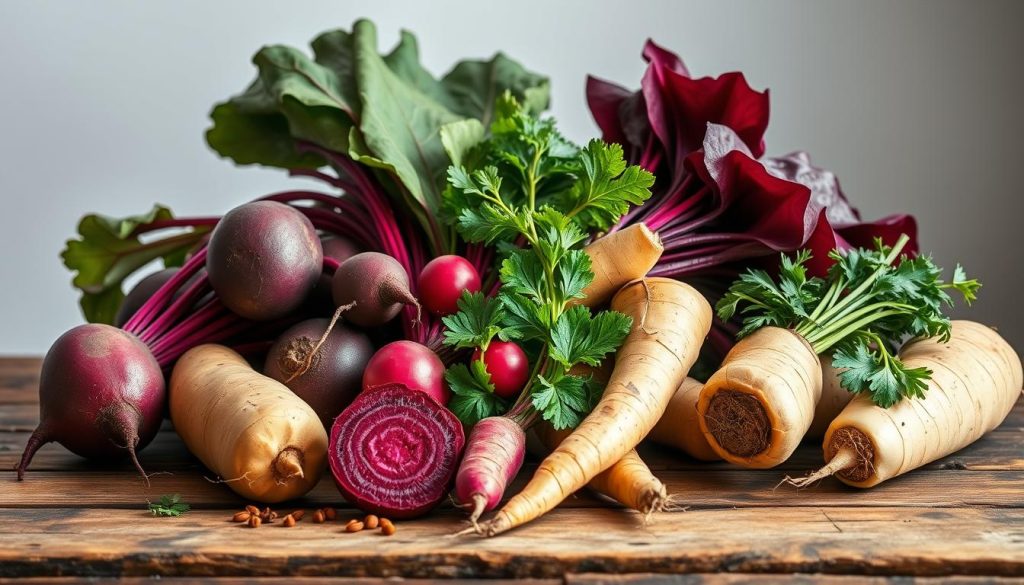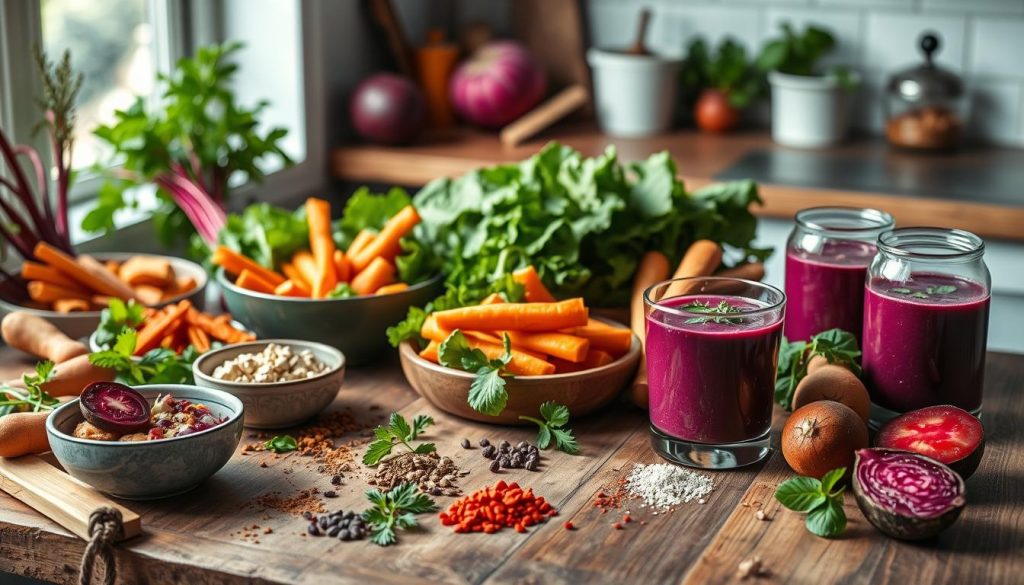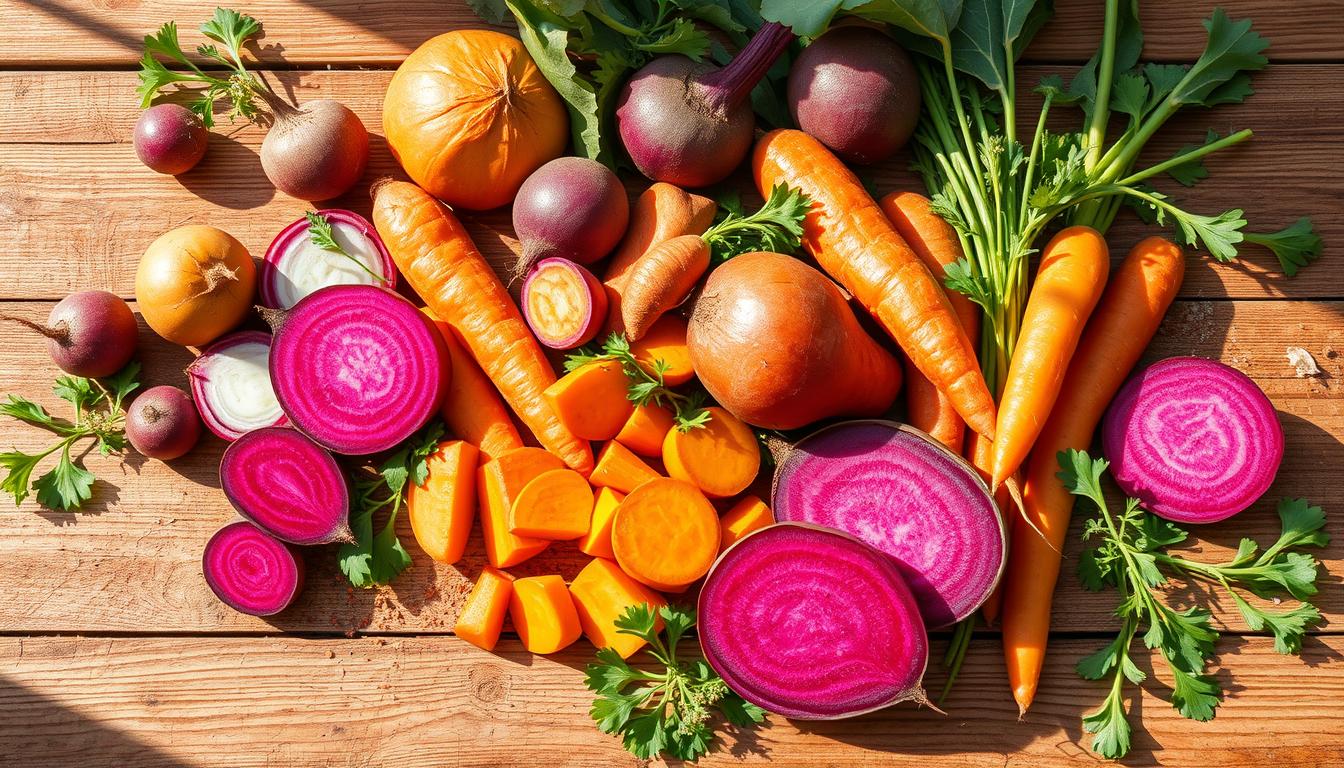Welcome to your complete guide on beet substitutes! If you’re looking for alternatives to beets, you’re in the right place. This guide will show you various beet substitutes that match beets in flavor and texture. They also offer similar nutritional benefits.
Many recipes lack variety, with 40% of customers saying so. Beet substitutes can add innovation to your kitchen. We’ll look at options like red cabbage, sweet potatoes, and carrots. Each has its own flavor and looks great in dishes.
It’s important to know the nutritional benefits of beets. They’re rich in vitamins C and folate. When choosing substitutes, you can save calories or try new tastes. You’ll find the perfect beet replacement to make your dishes vibrant and healthy.
Understanding Beets and Their Nutritional Benefits
Beets are known for their bright color and nutritional profile. They are full of vitamins and minerals that are good for your health. Adding beets to your meals can bring many health benefits and a tasty flavor.
Nutritional Profile of Beets
The nutritional profile of beets is impressive. Beetroots are made up of:
- Water: 87%
- Carbohydrates: 8%
- Fiber: 2–3%
One cup (136 grams) of boiled beetroot has less than 60 calories. They are a low-calorie but nutritious choice. Raw beets also offer:
| Component | Per 3/4 Cup (100 grams) |
|---|---|
| Calories | 43 |
| Protein | 1.6 grams |
| Carbohydrates | 9.6 grams |
| Sugar | 6.8 grams |
| Fiber | 2.8 grams |
| Fat | 0.2 grams |
Beets contain betanin, inorganic nitrate, and vulgaxanthin. They are full of antioxidants, which fight oxidative stress.
Health Benefits of Consuming Beets
The health benefits of beets are many and backed by research. Eating beets regularly can:
- Improve blood flow and lower blood pressure thanks to nitrates.
- Boost physical performance by enhancing oxygen use during exercise.
- Support digestive health with their fiber.
- Help reduce cancer risk by stopping cell mutations.
Beet juice can lower blood pressure by 3 to 10 mm Hg in a few hours. This shows how important beets are for a balanced diet and good health.
Why You Might Need Beet Substitutes
There are many reasons to swap out beets in your cooking. This vibrant veggie is loved for its health perks and taste. But, it might not fit everyone’s taste or recipe needs. Knowing why you might want beet substitutes can guide your choices.
Common Reasons for Substituting Beets
Some people find beet’s strong flavor too much, especially in dishes needing a lighter taste. Beets’ natural sweetness can throw off the balance in savory dishes. Also, fresh beets’ firm texture might not work with recipes needing softer or crunchier bits.
So, finding beet alternatives that are nutritious and taste good is key.
The Importance of Flavor and Texture in Cooking
Flavor and texture are key in cooking. Beets’ strong earthy taste can overpower other flavors in a dish. Sweet potatoes and red cabbage, for example, offer flavors that complement without taking over.
These substitutes can also match the texture your recipe needs, whether it’s crunchy or hearty. Plus, they add vibrant colors, making your dish both nutritious and visually appealing.
Choosing the Right Substitute for Beets
Choosing the right beet substitute means looking at flavor, texture, nutrition, and color. These factors help make your dishes taste good and look appealing.
Flavor Compatibility
It’s key to pick a beet substitute that fits with your dish’s flavors. Sweet potatoes add sweetness, making them perfect for balance. Red cabbage brings an earthy taste, great for salads and stir-fries.
Texture Considerations
Texture is important for a dish’s feel. Carrots offer a crunchy texture like raw beets. Turnips and parsnips add a crisp and sweet touch. You can use them in the same amount as beets for a similar feel.
Nutritional Similarity
It’s crucial to match the nutritional value of your beet substitute. Beet powder keeps many health benefits but has a different texture. Try using rutabagas or carrots, which are full of vitamins and minerals.
Color and Visual Appeal
The color and look of your dishes matter too. A good substitute should taste great and make your meal look good. Red cabbage and sweet potatoes add vibrant colors, making your food fun to eat.
Exploring Popular Beet Substitutes
Many vegetables can replace beets in your meals, offering different tastes and health benefits. When you try these beet substitutes, remember their nutritional values and how they can improve your dishes. They add important nutrients while making your food more interesting.
Red Cabbage: A Colorful Replacement
Red cabbage is known for its bright color and crunchy texture. It’s perfect for salads or as a garnish. It’s full of vitamins C and K, and fiber, which helps with digestion. Its earthy taste adds beauty and nutrition to your meals.
Sweet Potatoes: Sweetness with Health Benefits
Sweet potatoes are sweet and full of vitamins, especially vitamin A, which is good for your eyes. They become creamy when cooked, making them great in soups, casseroles, or as a side. Adding sweet potatoes to your meals brings flavor and health benefits.
Carrots: Crunch and Color
Carrots are a versatile choice, offering a nice crunch and bright color. They’re rich in beta-carotene and antioxidants, making them perfect for raw dishes, salads, or soups. Use them to add texture and flavor, and to make your meals more appealing.
Turnips and Their Unique Profile
Turnips have a unique taste that’s slightly bitter and peppery. They’re full of vitamins and minerals like vitamin C and potassium. They’re great in stews, roasted dishes, and purees, adding a special touch to your cooking.

Substitute for Beets Guide: Best Alternatives for Various Recipes
Looking for beet substitutes can change your dish without losing health benefits or taste. Whether you’re making salads, soups, or roasted veggies, there are many options to make your meals better.
For Salads: Fresh and Flavorful Options
For salad alternatives that match beets’ vibrant colors and earthy tastes, try these:
- Red Cabbage: It adds a beautiful color and crunch, plus vitamins C and K.
- Carrots: Sweet and crunchy, they’re a great choice.
- Radishes: They have a peppery taste and lots of vitamin C, adding flavor and nutrients.
In Soups and Stews: Nutty and Sweet Substitutes
For tasty soup and stew substitutes, use:
- Turnips: Mildly sweet, they cook down well, adding flavor.
- Parsnips: Nutty flavor adds depth to your dish.
- Sweet Potatoes: Sweet and creamy when cooked.
When Roasting: Vegetable Candidates
For roasted beet alternatives that caramelize well, try:
- Butternut Squash: Sweet and adds a lovely color to dishes.
- Turnips: Great for roasting, slightly sweet.
- Golden Beets: Different flavor than regular beets, perfect for roasting.
In Smoothies and Juices: Nutrient-Rich Picks
In smoothies or juices, use these nutrient-packed options:
- Carrots: High in vitamin A, adds color and sweetness.
- Sweet Potatoes: Creamy and nutritious, great in smoothies.
- Pomegranate Seeds: Vibrant color and full of antioxidants.
| Recipe Type | Substitute | Benefits |
|---|---|---|
| Salads | Red Cabbage | Rich in vitamins C and K, adds crunch |
| Soups & Stews | Turnips | Mildly sweet, softens well |
| Roasting | Butternut Squash | Caramelizes well, great flavor |
| Smoothies & Juices | Carrots | High in vitamin A, adds sweetness |
Creative Ways to Use Beet Substitutes in Your Cooking
Beet substitutes can change your kitchen game. They let you add new twists to old favorites. Plus, they bring health benefits to your meals. This mix of nutrition and creativity can make your cooking more exciting.
Incorporating Alternatives into Traditional Dishes
Try adding sweet potatoes to beet salads for a sweet twist. Red cabbage or roasted radishes can also add color and flavor. These changes keep the dish’s spirit while making it healthier.
Here’s a quick guide to some great beet substitutes:
| Substitute | Nutritional Benefits | Suggested Dish |
|---|---|---|
| Sweet Potatoes | High in vitamins A and C | Sweet Potato Beet Salad |
| Red Cabbage | Rich in vitamins C and K | Coleslaw with Beet Substitutes |
| Radishes | Low in calories, high in fiber | Radish and Beetroot Hummus |
| Pomegranates | High in antioxidants | Pomegranate Beet Salad |
| Cranberries | Rich in antioxidants | Cranberry Beet Smoothie |
Tips for Experimenting with New Vegetables
Be bold and try new veggies like radishes or pomegranates. They can bring new textures and tastes to your meals. These substitutes are great for making new recipes or refreshing old ones.
Adding different veggies to your dishes can make them healthier and tastier. This opens up a world of possibilities for creative cooking.

Health Considerations When Using Beet Substitutes
Exploring beet substitutes requires looking at allergies and nutrition. Some people might be allergic to beets, leading to breathing issues. Knowing about beet allergies helps you pick safe alternatives.
Allergies and Sensitivities
Beets are good for health but can cause allergies in some. Symptoms can be mild or severe. It’s key to know about allergies to vegetables like turnips or celeriac.
Always talk to a doctor about food allergies. This ensures you choose the right substitutes for you.
Nutritional Comparisons of Substitutes
Comparing vegetables shows beet substitutes’ value. Beets have lots of nitrates, but sweet potatoes and carrots are also nutritious. They’re full of vitamins and minerals that boost health.
Knowing the benefits of different substitutes helps you stay healthy. It also lets you get creative in the kitchen.
| Vegetable | Nutritional Benefits | Potential Allergies |
|---|---|---|
| Beets | High in nitrate and antioxidants, promotes cardiovascular health | Allergies to beets may include respiratory symptoms |
| Sweet Potatoes | Rich in vitamins A and C, good for immune function | Rare, but possible sensitivities |
| Carrots | High in beta-carotene, beneficial for vision | Possible reactions but uncommon |
| Turnips | High in fiber and vitamin C, promotes digestive health | May cause allergic reactions in some individuals |
Conclusion
This guide has shown you many beetroot substitutes. They offer great nutrition, taste well, and are easy to use in cooking. Red cabbage, sweet potatoes, carrots, and turnips are just a few examples. They add special flavors and textures to your food.
Using these substitutes makes your meals better. They cater to different tastes and dietary needs. This way, you can enjoy a variety of flavors in your dishes.
Cooking becomes more fun and healthy with these beet substitutes. Each one adds something unique to your meals. Whether it’s salads, soups, or smoothies, these options keep your diet interesting and nutritious.
Embracing these substitutes brings joy to cooking and eating well. With the right mix, you can make tasty dishes full of nutrients. This boosts your overall health and well-being.
Source Links
- https://thestonesoup.com/blog/2020/01/17/vegetable-substitutes/
- https://discover.texasrealfood.com/swap-and-savor/beets-substitutes
- https://gustomeadow.com/beets-substitutes/
- https://www.healthline.com/nutrition/foods/beetroot
- https://www.medicalnewstoday.com/articles/277432
- https://www.runnersworld.com/health-injuries/a20792878/beet-juice-alternatives/
- https://www.seniorsguide.com/senior-health/6-nutritional-benefits-of-beets-that-cant-be-beat/
- https://cookscrafter.com/beet-substitutes/
- https://extension.usu.edu/nutrition/research/beets
- https://casadesante.com/blogs/wellness/substitutes-for-beetroot?srsltid=AfmBOor2sdR7DtNo9jDymkO1x9DkFZx9vOLH56Wh4YeI8pwvkAWm3jeK
- https://pmc.ncbi.nlm.nih.gov/articles/PMC7600128/
- https://casadesante.com/blogs/wellness/substitutes-for-beetroot?srsltid=AfmBOoq1jVxRQ1xabfeMYltZJ_zEiIzF5cK44B2qgR0AVa2mfV_9nb6L
- https://www.ourharvest.coop/veggie-guide
- https://www.all-about-juicing.com/juicing-substitutions.html
- https://ask.metafilter.com/334529/Beetroot-recipes-for-someone-who-hates-beetroot
- https://casadesante.com/blogs/wellness/substitutes-for-beetroot?srsltid=AfmBOoov71BOHMJZBsIdtj2fTJXdYhEEmn7xo0IbIZKqRitP9AaMADH5
- https://pmc.ncbi.nlm.nih.gov/articles/PMC4425174/
- https://www.innerbody.com/best-beet-supplement
- https://www.medicalnewstoday.com/articles/beet-root-powder
- https://casadesante.com/blogs/wellness/substitutes-for-beetroot?srsltid=AfmBOoocFvEBcDy5CLewtIsQvjJOz1hAwYXY44Rf_wWKRajiFnpF0DKf
- https://jasbsci.biomedcentral.com/articles/10.1186/s40104-017-0154-8
- https://www.agproud.com/articles/36009-feed-beets-an-economical-substitute-for-grains
